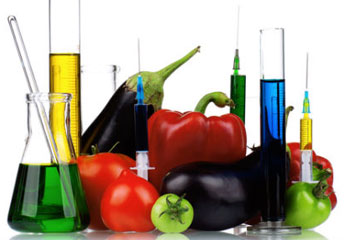
Genetically modified (GM) foods are the food stuff produced by means of genetic engineering. These changes are introduced either to add new characteristic or modify the existing one. Conventionally, this was done using breeding; however the modern techniques uses molecular biology and other sophisticated procedures. Briefly, the process involves inserting the gene of interest (which will be responsible for enhanced features) into the relevant plant or organism to derive the intended benefits. For example: Bacillus thuringiensis, is an organism which produces a toxin against insect larvae. The gene of this organism has been used to make corn crop pest resistant.
GM foods have following advantages:
- Resistance: Through genetic engineering one can modify the crops to make them resistant to pest and other insects which may harm the production. Instead, they produce their own toxins which prove fatal to such insects. This reduces the applications of chemical pesticides and thereby reducing the cost of bringing these crops into the market. Such crops are however quite safe for human consumption.
- Weather tolerance: GM crops are also developed to create tolerance to extreme climatic conditions. For example: Antifreeze gene has been used to make the tobacco and potato crops resistant to cold.
- Drought tolerance: With the growing population and lands turning unsuitable for farming, GM crops are being looked upon as a way to increase production.
- Nutrition: Crops such as rice are often deficient in necessary nutrients for its own growth. GM variants of rich help to alleviate such deficiencies.
- Food enhancement: GM foods at times are superior to the naturally occurring ones as they have enhanced color, size, nutritional content and flavor.
On the other hand GM foods have some disadvantages as well to offer:
- Environmental hazards: With the changes being incorporated in crops, these crops at times possesses threat to other organisms. B.t. corn has been found to cause high rate of mortality in monarch butterfly caterpillars as per the study published by Nature journal. Many pesticides’s efficiency has been reported to be decreasing over the period of time due to GM crops. Researchers fear that cross breeding may also result in transfer of some undesirable property into undesirable organism or plant resulting in more threat to the ecosystem.
- Human risks: Several children in U.S. have been reported to develop life threatening allergies to GM foods such as peanuts. Concerns regarding introduction of foreign gene into crops are raised as they may result in unacceptable changes.
The process of producing GM foods is a lengthy and costly affair. It demands rigorous testing to avoid undesirable changes and threats to both surrounding and society. GM foods can solve many food problems but strict regulations need to be in place to ensure that no unacceptable changes are being introduced.
